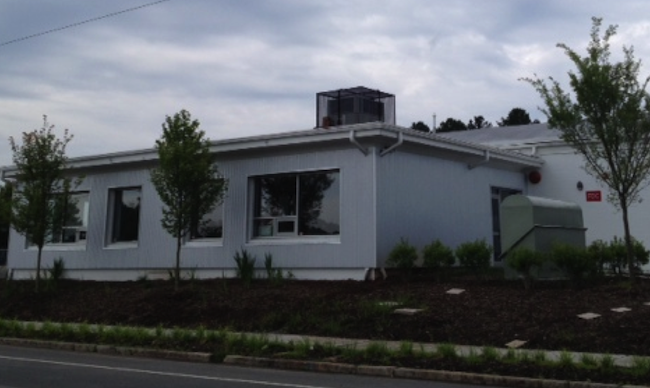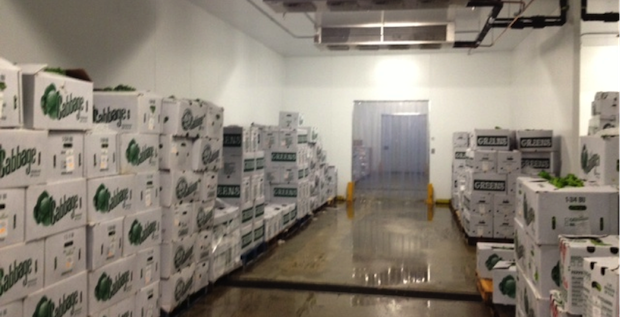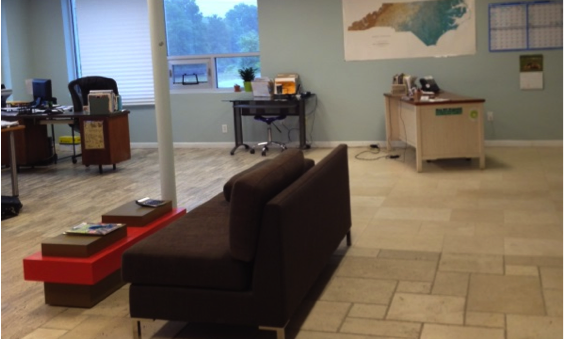FROM OLD WAREHOUSE TO HUB FOR GREEN GROWTH

The industrial landscape of East Durham is not the first place you’d think of when talking about farms and farmers. But the divide between agriculture and the urban environment has always been an imaginary one. Projects like Asheville’s Urban Farm School and Durham’s Mini-Farmery are already showing that serious amounts of food can be grown within city limits. And even for larger rural growers, access to urban markets, retail outlets and the transportation infrastructure which tends to coalesce around cities can be a huge boon in their efforts to stay competitive.
A new warehouse facility in a neglected industrial neighborhood in Durham aims to become a focal point for urban and rural growers alike. In doing so, it’s also creating a home for a broad range of like-minded, good-for-the-world organizations.
Farmer-Friendly Produce Distribution
Sitting across the road from a busy railway track, housed in an old marble and tile warehouse, sits the ECO Hub – the new home of the produce distribution company Eastern Carolina Organics (ECO). ECO was originally founded on the realization that farmers’ markets were not enough to ensure a viable, vibrant and diverse local food system. What local farmers needed more than anything was access to the kinds of logistical operations that make the large-scale industrial agricultural operations such an attractive proposition for major retailers.
ECO CEO Sandi Kronick explains more:
“We knew that farmers wanted to focus on their farm and would appreciate someone else staying on top of a regular weekly schedule, maintaining the liability insurance, coordinating the farm tours and store cooking demos, knowing what innovative packaging was coming on board, and making sure that customers actually paid invoices. These are all critical to sustainability, and vital to being able to compete with a traditional wholesale produce industry, but all can be huge distractions to a farmer who is juggling seed germination, weather, crop rotations, labor, etc.”

An Urban Hub for Sustainable Growth
As demand for ECO’s services has grown – both from farmers needing distribution, and retailers wanting to tap into the growing market for local and sustainable grown foods – ECO realized it was time to both expand its operations and move from its rural, Chatham County location to somewhere with better transportation infrastructure.
The idea of the ECO Hub was born:
“We severely outgrew our location in the adorable town of Pittsboro, NC and knew that if we wanted to buy a warehouse, it needed to be a smart real estate investment as well. (It’s always a very helpful burden to remember that I have 15 farmers who are my business partners!) Durham is closer to many of our customers, and a great location to attract like-minded businesses and non-profits to function as tenants in our dream, the ECO-HUB. We needed a space close to the highway for our transportation purposes but close enough to downtown to be accessible by bike/bus and to attract cool people to work here.”
Green Renovations. Ethical Backers.
With the help of loan from Self Help Credit Union, Natural Capital Investment Fund, and Whole Foods Local Producer Loan Program, ECO entered into a long search for appropriate facilities – followed by extensive renovations that included aggressive sustainable building measures that included high-tech LED lighting (from local sustainable lighting pioneer CREE), Solatube daylighting, energy efficient refrigeration units, improved insulation and a heavy emphasis on reuse and reclamation throughout the renovations.
Modeling Sustainable Light Industry
In January 2013, the ECO Hub was born. Housing gigantic coolers, loading bays, office space and meeting rooms, the location provides plenty of room for ECO to expand. Perhaps most importantly, however, the space also provides a home for several like-minded operations including sustainable landscaping company Bountiful Backyards, local meat distributer Firsthand Foods, green accounting firm The Green Bean Counter, brand strategy specialists The Change Creation (Disclosure: I am creative director and co-owner of The Change), music summer camp Girls Rock NC and organic pest control manufacturers I Must Garden. It’s this function as a meeting place of different entities that Kronick sees as one of the key benefits of the new space:
“The goal of the ECO-HUB is to have neighbors that inspire us and leave room for all kinds of unplanned synergy, and to support younger entities by sharing the things that we need, but don’t need all the time – like forklifts and nice conference rooms. It’s much easier for us to find tenants to help us fill out space we don’t yet need then to pack our coolers up and move every 10 years. We’re offering affordable rent to amazing organizations and they’re helping us to pay our mortgage.”

More than anything else, says Kronick, HUB is a model for a new kind of economic development – one that sees benefit beyond the financial bottom line, and empowers stakeholders to commit to and invest in the communities around them:
“HUB is demonstrating the role that sustainable light industry can play in workforce development and overall economic growth. Organics, family farms, and people doing ‘good’ with their career choices are really good for communities and we want to play a part in modeling that, and hopefully bringing the nay-sayers over to the bright side.”


